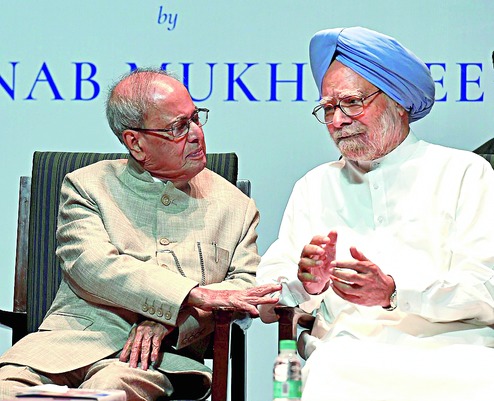
New Delhi, Oct. 13: The self-confessed "accidental politician" today let the cat out of the bag and pulled off the unlikely feat of bringing the house down.
"When Soniaji chose me to be the Prime Minister, Pranabji was the most distinguished colleague I had. He had every reason to feel a grievance, that he was better qualified than I was to become the Prime Minister but he also knew that I had little choice in the matter," Manmohan Singh deadpanned today, with Sonia Gandhi looking on.
The former Prime Minister was delivering a short speech to mark the release of the former President's book, The Coalition Years: 1996-2012.
Those sitting with Sonia in the front row of the Teen Murti Auditorium said she laughed along with the rest of the gathering at Singh's candour. A photograph did offer evidence of Sonia's mirth.
The fleeting but telling moment came at an ironical phase in national politics. Manmohan has spoken up and left his audience in splits at a time Narendra Modi - his successor who had called him "Maun Mohan" - is being accused of falling silent whenever uncomfortable issues crop up. The latest issue over which Modi has maintained a studious silence is a report on a company owned by BJP president Amit Shah's son.
This evening, Manmohan, as always, remained unaffected by the reaction to what he had said, moving on in his impassive style to flag some milestones in his association with Mukherjee that goes back to the early 1970s.
But Manmohan took care to ensure that his remark would not be construed as evidence of a strained relationship with Mukherjee - known as permanent Prime Minister owing to his initials - during the UPA years. The former Prime Minister described Mukherjee as his go-to person for trouble-shooting - be it to reconcile differences within the cabinet, the coalition or Parliament.
"Pranab Mukherjee is a politician by choice and is one of the greatest politicians living in the country. I became a politician by accident when P.V. Narasimha Rao invited me to become finance minister," Manmohan had said earlier.
Manmohan's revelation on how he became Prime Minister provided the lighter moments to a gathering of politicians facing an existential crisis. But all present appeared to be conscious of the adage "united we stand, divided we fall" and appeared to be trying to build an appetite for coalition politics that is often scoffed at.
The tone was set by Mukherjee himself who described the Congress as a coalition that brings on one platform varied groups and ideas. So, he pointed out, during the 10 years of the UPA, the Congress was technically managing two coalitions - itself and the coalition it was leading in government.
Referring to a perception that coalitions are inherently unstable, CPM's Sitaram Yechury said one of the reasons India had single-party rule for 30 years after independence was the idea that India itself was a grand coalition. That was reflected in the Congress - the biggest coalition. "You cannot have a politically monolithic structure over as diverse a society and polity as ours," he said.
Sudhakar Reddy of the CPI said coalitions were made either out of opportunism or necessity. "In India, coalitions have emerged out of the compulsion to defend secularism, and we have to take lessons from the past now when the country is facing threats to its democracy and the Constitution."
The youngest politician on the dais, Akhilesh Yadav of the Samajwadi Party, likened the book to good notes that one collects before an examination. "This is a good book to have before the elections. It is a handy book to have as there is talk of coalitions," Akhilesh said.
Published by Rupa Publications, The Coalition Years is the third of a trilogy; the first two having come out when Mukherjee was in Rashtrapati Bhavan. The trilogy sums up his political journey, and Mukherjee held out the promise of a fourth book on his years as President.
But the man who has had a ringside view of Indian politics for nearly five decades and has the "memory of an elephant" has already made it clear - during the release of the second of his trilogy last year - that his memoirs are not tell-all books. "Some facts are to be buried with me."











